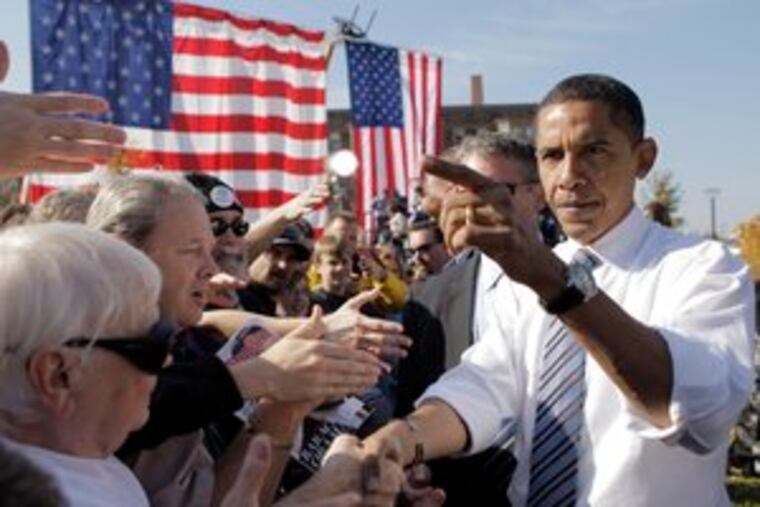Candidates start a weekend sprint
McCain, Obama fought over familiar and unlikely terrain.

DES MOINES, Iowa - As the presidential campaign entered its final weekend, Barack Obama returned to Iowa, the state one adviser described as "hallowed ground" because of the role it played in launching his candidacy, while John McCain spent his second straight day in Ohio, a state he almost certainly must win to reach the White House.
"What you started right here in Iowa has swept the nation," Obama told 25,000 people at a downtown Des Moines rally that contrasted sharply with the gatherings in backyards and school gymnasiums during the long months before he won the January caucuses.
His campaign signaled its growing confidence by beginning TV ads in McCain's home state of Arizona, as well as in Georgia and North Dakota, all places that until recently, McCain was expected to win easily. Obama continues to campaign exclusively in states won by President Bush in 2004.
But McCain said he was optimistic as he prepared for a final blitz that will include stops in seven states Monday. "The pundits, my friends, have written us off, as they've done before," he told a crowd in Hanoverton. "But we're closing, my friends, and we're going to win Ohio."
McCain strategists contend that Obama's lead is narrowing and predicted a historic upset. Political director Mike DuHaime said McCain forces had made 150 percent more phone calls and door knocks this week than the Bush campaign made during the same stretch four years ago. The goal is 17 million more contacts with voters before polls close.
"We've been able to really expand, year after year, using our technology," DuHaime said.
Yet the McCain campaign continues to face a daunting electoral map, where a wide array of polls show Obama with several plausible paths to victory.
A surge in early voting by Democrats marks a reversal of the pattern that helped Bush win in 2004 and makes McCain's task more difficult. So far, 200,000 more Democrats than Republicans have cast ballots in Florida, while 19 percent of Democratic early voters in North Carolina did not vote in 2004.
"The die is being cast as we speak," Obama campaign manager David Plouffe said. "On Election Day, Sen. McCain is not going to have to just carry the day, but carry it convincingly."
McCain has less money, a smaller field organization, and a closer identification with the nation's economic troubles and the unpopular Bush administration.
Obama continued to hammer McCain as a candidate who he said has no significant economic policy differences with Bush. He said his opponent would do little to help the middle class and had turned to negative campaigning despite a 2000 pledge not to "take the low road to the highest office in this land."
As he barnstormed Ohio, McCain focused on two principal arguments, telling audiences that he will reform the federal government and will not raise taxes. He reminded voters that no presidential contender since 1960 had won without taking Ohio.
Borrowing an Obama argument, he boasted: "We're going to change America."
"Sen. Obama has been in the left-hand lane of American politics," McCain told supporters in Steubenville. "He's a taxer and a spender."
Republicans, in recent elections, have done better than Democrats in getting voters to cast ballots before Election Day, yet Plouffe cited projections for unusually high Democratic turnout in such battleground states as North Carolina, Nevada, New Mexico and Virginia.
In Florida, Plouffe said, Republicans finished with a 40,000-vote edge among early and absentee voters in 2004, while Democrats currently have a 200,000-vote lead. He said Obama was doing better with Hispanics, including Colombians, Puerto Ricans and young Cuban Americans, than did Sen. John Kerry.
"We're kind of out of the land of theory in a lot of these states. You're beginning to see how this election is likely to unfold," Plouffe said. "We're confident that we've got a lot of good voters left."
In Iowa, Democrats have cast more absentee ballots than Republicans every day but one since voting began, Plouffe said.
As for Arizona, there is a thumb-in-the-eye quality to Obama's decision to buy ads in the Republican nominee's home state. Yet polls have shown the presidential race tightening there and Obama leads in neighboring New Mexico, Colorado and Nevada.
"If someone else had been the nominee," Plouffe said, "I think Arizona would have been a full battleground."
After a stop home in Chicago to share Halloween with his two daughters, Obama took a bus ride about 30 miles across the state border, capping his day with a rally in Highland, Ind. "We are four days away from changing the United States of America," he proclaimed to a cheering crowd on a comfortable October evening.
Indiana is one of about a half-dozen states that went for Bush twice but remain up for grabs late this election season. Bush won the state, 60 percent to 39, in 2004, and the competitive nature of the state this time around shows the strength of Obama's standing.
Obama used the occasion of Halloween to rib McCain in a new way, saying the Republican wore his usual costume: "Just like every year, he's going as George W. Bush."